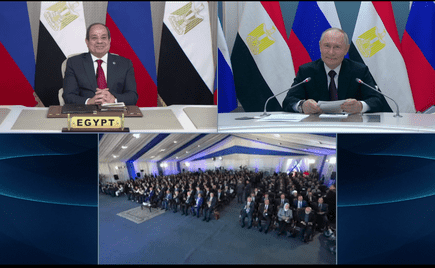Africa
Installation of Russian Reactor Vessel in Egypt -By Kestér Kenn Klomegâh
Both the Egyptian and Russian sides expressed appreciation – for their dedication and outstanding efforts in achieving unprecedented standards throughout this project’s implementation. International Atomic Energy Agency (IAEA) Director General, Rafael Grossi, also addressed the ceremony participants with a video message.

On November 19, President of the Russian Federation, Vladimir Putin, together with President of the Arab Republic of Egypt, Abdel Fattah el-Sisi, held a via videoconference, in a ceremony marking the installation of the reactor pressure vessel of the first power unit of the Egyptian El Dabaa Nuclear Power Plant.
The plant is being constructed by State Atomic Energy Corporation Rosatom under the 2015 Russia-Egypt intergovernmental agreement. The NPP will feature four power units with a total capacity of 4,800 MW.
Putin underlined during the ceremony that the El Dabaa Nuclear Power Plant explicitly demonstrated transition into a crucial stage in the technological outfitting of the future plant. In the foreseeable future, it will begin generating the electricity required to meet the needs of Egypt’s growing economy.
The ceremony coincided with President Abdel Fattah el-Sisi’s birthday – November 19. “We are grateful for the consistent attention you devote not only to this flagship project in the field of the peaceful atom, but also to the overall expansion of diverse contacts with Russia. We fully share this approach and remain committed to a comprehensive strengthening and deepening of our partnership with friendly Egypt,” Putin said in the video conference.
Russian-Egyptian relations are steadily developing on the basis of the Strategic Cooperation Agreement, in the spirit of equality, mutual respect, and consideration for each other’s interests. This reflects the best traditions of the interstate ties, which have been built over many decades.
The industrial cooperation is growing stronger. In the pipeline, ther are efforts to create a Russian industrial zone in the Suez Canal area. In addition, Russia is currently training nuclear engineering personnel for Egypt. Over 100 Egyptian students have received relevant education at Russian universities. In July, a special training and advanced training centre opened at the power plant with support from the Rosatom Academy.
Soviet specialists contributed to the development of Egypt’s economy, helping to build major industrial, energy, and infrastructure facilities throughout the country. Many of these joint projects, such as the Aswan Dam, the Helwan Iron and Steel Complex, and the Nag Hammadi Aluminium Plant, have become enduring symbols of friendship and have brought, and continue to bring, tangible benefits to the Egyptian people.
President of the Arab Republic of Egypt, Abdel Fattah el-Sisi, extended his sincere gratitude to President Vladimir Putin, stating further that support of this strategic undertaking and for his dedication to ensuring its success are signs of useful strategic cooperation. Egypt and Russia have have awaited this turning point, now becoming a reality, thanks to hard work, perseverance, and the relations between the Arab Republic of Egypt and the Russian Federation.
According to President Fattah el-Sisi, the sustainable strategic relations cover a wide range of areas and are built on mutual respect and understanding despite international and regional challenges. This shows that the partnership is not limited to political dialogue, but is embodied in tangible, practical projects that serve the interests of both peoples, especially in the context of the global crisis and rising energy prices, and reaffirms the wisdom of the Egyptian government’s decision to revive the peaceful nuclear program, ensuring sustainable energy supplies.
In line with Egypt Vision 2030, this event confirms Egypt’s role as a regional energy hub and aligns with our efforts to achieve comprehensive development. The El Dabaa NPP represents a turning point in the localisation of knowledge and a genuine investment in national human resources. Cooperation in training, and technology transfer will help prepare a new generation of Egyptian nuclear experts.
Both the Egyptian and Russian sides expressed appreciation – for their dedication and outstanding efforts in achieving unprecedented standards throughout this project’s implementation. International Atomic Energy Agency (IAEA) Director General, Rafael Grossi, also addressed the ceremony participants with a video message.
























